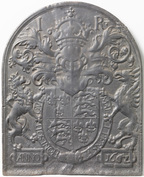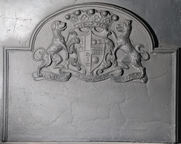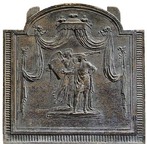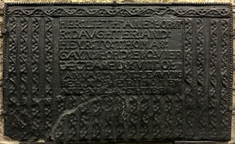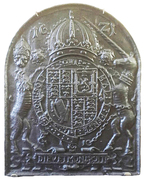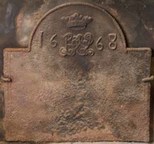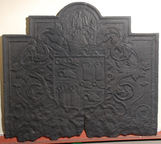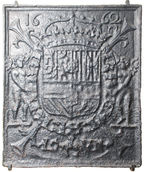-
1231
Description: Arched rectangular shape; ovolo-moulded edging; shield, Garter, crowned helm and mantling of the English royal arms to 1603 with crowned lion and griffon supporters standing on separate rectangular cartouches containing the word 'ANNO' and the date '1662'; above the mantling are the initials 'I R'
Notes: The date appears to have been altered from 1602. The initials 'I R' for Jacobus Rex (James I of England) are inappropriate for the date in both its original and its altered form; also the griffon supporter on the sinister side is incorrect, a dragon being correct for the arms of Elizabeth I in 1602. There is a vertical plankline left of centre.
Inscription: I R / HONI SOIT QVI MAL I PENSE / ANNO 1662
Arms: English Tudor royal
- Decoration tags:
- rounded arched (shape)
- ovolo (edging)
- whole carved pattern
- individual letters
- planklines
- heraldic
- armorial
- royal
- text
Manufactured: in 1662 possibly in the Ardennes area of Belgium.
Current location: Rijksmuseum, Museumstraat, Amsterdam South, North Holland, Netherlands.
Museum number: BK-NM-10837 (part of the Rijksmuseum museum group)
-
250
Description: Arched rectangular shape; astragal and fillet edging; shield, motto, earl’s coronet and supporters (a talbot erm. and a wolf or, ducally crowned gu.) of Stanhope impaling Pitt: quarterly (1st & 4th) erm. (2nd & 3rd) gu. (Stanhope); sa., a fess chequy az. and ar. between three bezants (Pitt); motto: A DEO ET REGE.
Notes: James Stanhope was created 1st Earl in 1718; he had married Lucy Pitt in 1714. The Stanhope seat was Chevening, near Sevenoaks.
Inscription: A DEO ET REGE
Arms: Stanhope impaling Pitt; James, 1st Earl Stanhope
- Decoration tags:
- rectangular with round arch (shape)
- astragal & fillet (edging)
- carved pattern panels
- armorial
- text
Manufactured: in the early-18th century in England.
Current location: Chevening Park, Chevening, Kent, England.
- Attached to series:
- Personal armorial firebacks
- Stanhope series
-
933
Description: Carved wooden fireback pattern. Arched rectangular shape with fillet and cavetto-moulded edging; a canopy with swagged drapery descending from ribbon bunches, beneath which stand two figures: behind, a female angelic figure, right breast exposed, blowing a trumpet held in her left hand and holding an arched rectangular shield in her right hand; in front, a classically dressed male figure wearing a face mask; slatted extensions to the side and bottom; two battens to the rear of the pattern, visible at the top.
Notes: The significance of the scene has not been identified. Christie's auction 3 Jul 2002 lot 160 (£588).
- Decoration tags:
- rectangular with round arch (shape)
- fillet (edging)
- whole carved pattern
- planklines
- pictorial
- architectural
- humans
Manufactured: in the mid- to late-18th century in France.
Current location: not known.
- Attached to series:
- Patterns
-
57
Description: Rectangular; rope edging on top and sides; central inscription panel; repeated trailing vine decoration from impressed wooden strips — one horizontal line at top, four vertical strips each side of panel, eleven vertical strips below.
Notes: This fireback came to East Grinstead church from Hurst-an-Clays, a former farmhouse on the edge of the town, in 1933. The inscription is from the same carved pattern used on the graveslab of Anne Forster in Crowhurst church, Surrey; several firebacks have been cast using this panel, each different in other details from the rest. All of the firebacks using this inscription date from after 1591.
Inscription: HER : LIETH : ANE : FORST/ R : DAVGHTER : AND : / HEYR : TO : THOMAS : / GAYNSFORD : ESQVIER / DECEASED : XVIII : OF: / IANVARI : 1591 : LEAVYNG / BEHIND : HER II : SONES : / AND : V : DAVGHTERS
- Decoration tags:
- rectangular (shape)
- rope (edging)
- simple stamps
- carved pattern panels
- text
- objects
Manufactured: in the late-16th century possibly at Pounsley Furnace, Framfield in the Weald area of England.
Current location: St Swithun's Church, High Street, East Grinstead, West Sussex, England.
-
994
Description: Arched; cavetto-moulded edging; English royal Stuart shield, garter, crown, supporters, and motto on a cartouche; a monogram of S and C lies to the left of the Garter buckle; a small rose stamp is repeated each side of crown; date split each side of top of crown.
Notes: Although English arms, the design is in a continental style, arched firebacks being typical of Lorraine. In some later recastings the proportions have been distorted, making them narrower, and the '16' of the date is missing. The fireback illustrated was formerly in the city museum of Vlissingen in the Netherlands.
Copies of this fireback are known.
Inscription: 16 21 / HONI SOIT QVI MAL I PENSE / SC / DIEV ET MON DROIT
Arms: English Stuart royal (James I)
- Decoration tags:
- rounded arched (shape)
- cavetto (edging)
- whole carved pattern
- heraldic
- monogram
- armorial
- royal
- text
Manufactured: in 1621 possibly in the Ardennes area of Belgium.
Current location: not known.
Citation: Gardner, J. S., 1898, 'Iron Casting in the Weald', Archaeologia, 56, 1, pp. 133-164.
- Attached to series:
- Jacobean royal armorial firebacks
- Stuart royal armorial firebacks
-
1225
Description: Arched rectangular shape; twisted rope edging (top and sides); in arch, marquess's coronet above a monogram with date split either side.
Notes: The elaborate monogram has not been deciphered, but the fireback does not appear to be related to the Talbot family who owned Lacock throughout the 17th century.
Inscription: 16 [undeciphered monogram] 68
- Decoration tags:
- rectangular with round arch (shape)
- rope (edging)
- whole carved pattern
- individual numbers
- heraldic
- monogram
- text
Manufactured: in 1668 in England.
Current location: Lackock Abbey, Lacock, Wiltshire, England.
Museum number: 996713 (part of the National Trust museum group)
- Attached to series:
- Miscellaneous pattern firebacks
-
394
Description: Rectangular, with arched rectangular extension on top; double astragal edging (top & sides); shield, helmet, crest and mantling of the Pelham family: quarterly, 1st and 4th, Azure, three pelicans vulning themselves proper; 2nd and 3rd, Gules, two broken belts palewise the buckles upwards argent; the crest: a peacock in pride argent.
Notes: The arms may be those of Sir Nicholas Pelham (1517-59) or of one of his two sons, Sir John (d. 1580) or Sir Thomas (c1540-1624); the latter was created a Baronet in 1611. As there is no evidence of the augmentation of a baronet on the arms, the fireback probably predates the creation of the baronetcy. Formerly part of the J. H. Every collection.
Copies of this fireback are known.
Arms: Sir Nicholas, Sir John or Sir Thomas Pelham
- Decoration tags:
- rectangular with round arch (shape)
- double astragal (edging)
- whole carved pattern
- armorial
Manufactured: in the early-17th century possibly at Waldron Furnace in the Weald area of England.
Current location: Anne of Cleves House, Southover High Street, Lewes, East Sussex, England.
Museum number: 1944.24.054 (part of the Sussex Archaeological Society museum group)
- Attached to series:
- Pelham family firebacks
- Personal armorial firebacks
- Low relief armorial series
-
823
Description: Arched shape with ovolo egg-and-dart edging; crown surmounting a shield, a quartered shield with an escutcheon impaling a crowned lion rampant with an escutcheon; text along the bottom.
Notes: The arms have not been identified; LOVEN is the town of Leuven, capital of the province of Brabant, which, in 1662, was in the Spanish Netherlands.
Inscription: LOVEN 1662
- Decoration tags:
- rounded arched (shape)
- ovolo, egg and dart (edging)
- carved pattern panels
- armorial
- text
- plants
Manufactured: in 1662 possibly in the Ardennes area of Belgium.
Current location: in private hands, Mayfield, East Sussex, England.
- Attached to series:
- Foreign armorial firebacks
-
1141
Description: Arched rectangular shape; twisted rope edging (top and sides); date stamp, 1634, in arch; initials, EH, separated by a cross, below date.
Notes: The same date stamp has been noted on another fireback; the cross between the initials may have an apotropaic purpose.
Inscription: 1634 /E + H
- Decoration tags:
- rectangular with round arch (shape)
- rope (edging)
- simple stamps
- individual letters
- date stamp
- apotropaic
- text
- objects
Manufactured: in 1634 in England.
Current location: Newark Park, Ozleworth, Gloucestershire, England.
(part of the National Trust museum group)
- Attached to series:
- 1634 stamp series
-
524
Description: Rectangular; cavetto-moulded edging; shield, crown and supporters of King Philip IV of Spain, incorporating the arms of Castille and Leon, Aragon - Sicily, Granada, Portugal, Austria, Burgundy and Brabant; around the shield is the chain of the Order of the Golden Fleece; at the top, the date split by the crown; behind, crossed lilies.
Notes: By 1662 the arms of Portugal were redundant on the Spanish royal arms, but were retained until after the death of Philip IV; the word, LOVEN, indicates the particular association of this plate with the town of Leuven, the capital of Brabant in what was, at the time, part of the Spanish Netherlands. Mitford collection, Petworth House.
Inscription: 16 62 / LO VEN
Arms: King Philip IV of Spain
- Decoration tags:
- rectangular (shape)
- double fillet (edging)
- whole carved pattern
- individual numbers
- armorial
- royal
- text
Manufactured: in 1662 possibly in the Eifel area of Germany.
Current location: Petworth House, Petworth, West Sussex, England.
Museum number: NT/PET/M/78 (part of the National Trust museum group)
- Attached to series:
- Foreign armorial firebacks
